Now that we are aware of the numerous blockchain use cases, it is time to move on and talk about NFTs in gaming. Businesses who are preparing to build role-playing games need to be aware of the indisputable impact that NFTs have on this. We’ll go through many aspects of role-playing game production and how NFTs can improve the overall user experience in this post.
Definition of Role Playing Games (RPG)
In a RPG Game Development Service, the player assumes the role of a character and uses them to create and experience an adventure or series of incidents. The player can then use the experience they gain from these events to advance their character’s skills, and the game’s rules are designed to reflect as much of the character’s world as possible.
How NFTs Can Be Very Important In The Development Of Role-Playing Games
NFTs are an intriguing idea because in-game rewards and assets, which players can unlock or obtain after reaching specific specified milestones, are a common feature in NFTs in the Development of Role Playing Games. Few games, in addition, require players to buy particular items in order to move on to the next level.
Unfortunately, there are no alternatives for trading assets as players go through the game in a centralized gaming environment. Even worse, players can lose their investments if the gaming organization stops offering its services.
This is changing with NFTs. A unique digital token that cannot be exchanged for another is known as an NFT.
Said, an NFT’s owner is assured to be the only owner of that digital token because an NFT cannot be duplicated.
Because they enable the production and attribution of value to various assets, NFTs are perfect for the gaming sector. Characters, homes, properties, and other non-exchangeable assets can be tokenized. The gaming businesses create limited editions of these assets since they are rare and hard to come by, which drives up their price.
Players can acquire digital assets through NFTs in the Development of Role Playing Games that they can store as collectibles or sell for money on online marketplaces.
This feature has made crypto-RPG games more appealing, which explains why so many game developers have entered the industry. Due to the significant advantages of crypto games, gamers and collectors are becoming more interested in them. The user’s true ownership of the in-game assets enables them to:
- To receive the equal value of the NFT, transfer it to another account and use the game’s reserves.
- You can trade the NFT in secondary markets.
- Utilize compatible items in other supported games.
Gaming NFTs: Opening Up New Revenue Streams
The worth of in-game items to players may be greatly increased if they are made available as NFTs. Users are able to move their assets to an external wallet or even between games thanks to the verified ownership and mobility provided by NFT-stored assets.
The additional supply and demand factor in secondary marketplaces can present a compelling value proposition, even for non-gamers interested in profitably selling in-game NFTs.
NFTs for gaming have also been selling for exorbitant rates this year, despite the fact that NFT-based art has received the most of the attention. Virtual real estate tokens known as LAND NFTs from the Decentraland game have sold for close to $1 million.
The significance of a company that can enable NFT-based gaming platforms for role-playing games
Given the abundance of alternatives available to game developers, it is puzzling why more of them aren’t diving deep into NFTs and blockchain.
There are some instances where established game developers are exploring uncharted waters. For instance, Sony has licenced the blockchain-based NFTs in the Development of Role Playing Games game Six Dragons for the Playstation 5, even though it is still in development.
The majority of NFT games, led by Axie Infinity, are now, however, crypto-native. There are a few reasons why this might be. The development of scalable systems that can compete with centralized servers in terms of transaction volume has, to start with, taken some time.
Roleplaying game production using NFTs faces a bigger challenge because most game developers are unfamiliar with blockchain technology. On the other side, the typical smart contract writer may not be adept at developing fun games or the intricate user interfaces necessary to compete with well-known titles.
A business like Protokol may be able to help close the gap in this situation. We work together with game developers and studios to create a blockchain solution for their product line and a thorough plan for integrating blockchain and NFTs into their games.
The developer, the player, and other stakeholders like sponsors should all gain from the blockchain strategy, as well.
The Benefits of NFT Game Creation
Ownership of the Players’ Digital Content
One-time, non-transferable commodities that remain in the gaming ecosystem are frequently in-game purchases.
NFTs give gamers access to and control over their in-game possessions. The assets of the game can be retained by the player, sold to other players, or transferred to another platform that supports the game.
Scarcity
Rarity and authenticity are valued highly by collectors. Anyone can demonstrate an in-game NFT asset thanks to its immutable records. Each NFTs in the Development of Role Playing Games number, individuality, and history are verified by the distributed public ledger.
Interoperability
The majority of online games are run by a single central server. The game’s assets are kept on separate, proprietary platforms that don’t talk to each other. On their blockchains, however, decentralized games function.
These blockchains serve as the structural backbone for more games on the same network. Because of this networking, in-game assets are represented by NFTs that can function in a variety of settings. The Ethereum network games can theoretically support the same assets.
Immutability
The player loses all of their in-game purchases when the servers of a typical online game crash. NFTs, on the other hand, are solely based on the blockchain and operate independently of any specific gaming platform.
The 10 Best Gaming Keyboards of 2022
As a result, a player can buy and sell NFTs regardless of what happens in the game. On an existing blockchain system, new games can be made to function. Furthermore, due to their immutable records and unique nature, blockchain-enabled gaming assets are unchangeable.
improved marketing opportunities
For gamers who enjoy trading their in-game items, NFTs provide a terrific opportunity to make money. This provides game developers and platform owners with an additional benefit for marketing their services to gamers. The 8 Best Monitors of 2022
The proprietors of the platforms can advertise their gaming services as a secondary source of income, luring both casual players and those seeking a second source of money.
The sector holds great promise despite many obstacles. This possibility might entice gamers to focus on or try out NFT Game development.
These companies can work with any RPG game production studio that is tech savvy and capable of assisting them in achieving their goals.
The popularity of decentralized gaming apps also promotes the expansion and development of NFT infrastructure. Hire an RPG game development company right away to fulfil your future gaming unicorn ambitions.



